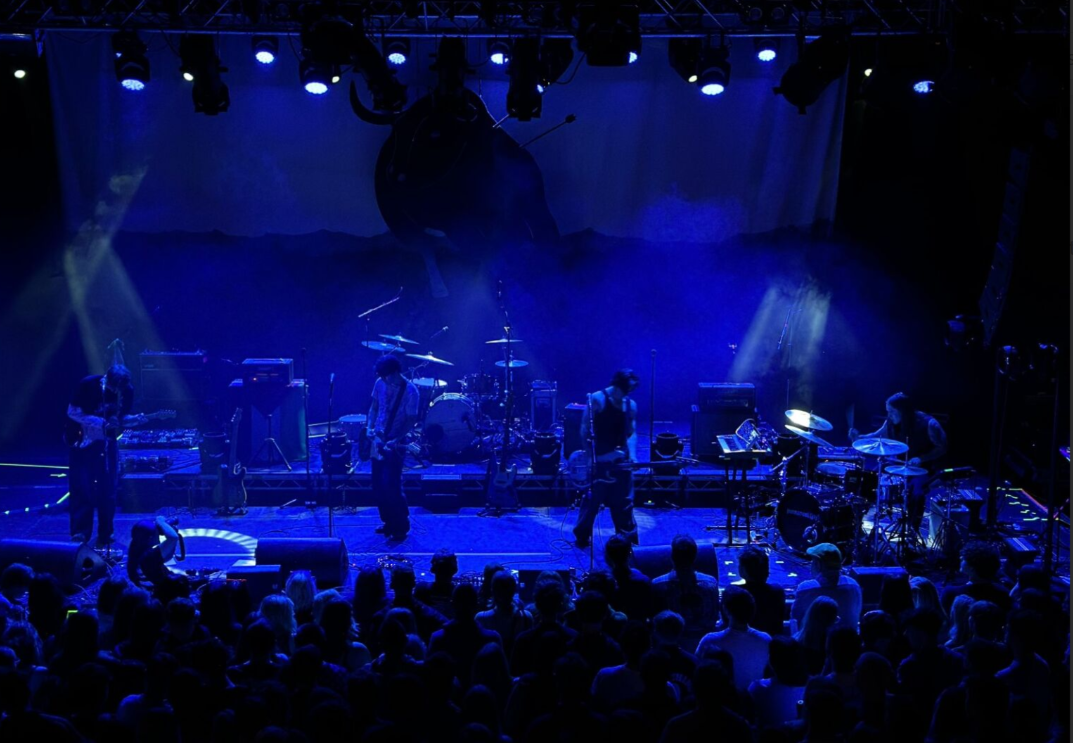Film and TV co-editor John Jones pays tribute to one of comedy’s most unique, resilient and undervalued formats.
Today, comedy as we have known it is under threat. It’s clear where contemporary audience demand lies; listings are dominated by gritty crime dramas, innovative sci-fi thrillers and tawdry reality shows that pander to the lowest common denominator. Within the genre itself, the cult classics of the 2000s ÔÇô Peep Show, The Mighty Boosh and the ilk ÔÇô have had their day, whilst the comedic tastes of viewers have also altered. Being funny for funny’s sake no longer seems to cut it – audiences now expect more from their comedy; more political, more layered, more refined. Whilst this has been realised in the US through Donald Glover’s nuanced series Atlanta and Aziz Ansari’s widely acclaimed Master of None, such a shift has left a dangerous void in British comedy programming ÔÇô one that has yet to be filled by original and sustainable content.
And, yet, there is hope from an unlikely yet durable source. Whilst many comedy dramas and sketch shows have fallen by the wayside, the mockumentary has survived shifting audience tastes and growing ÔÇÿcultural snobbery’ ÔÇô a charge levelled at social commentators by comedian and writer Ben Elton ÔÇô to restore a healthy pulse to an otherwise depleted genre.
Whilst some titles embraced the mockumentary style prior to the Eighties ÔÇô most notably, Richard Lester’s subtle Beatlemania-era comedy A Hard Day’s Night ÔÇô it is Rob Reiner’s 1984 masterpiece This is Spinal Tap that is widely credited as the seminal work of the sub-genre. Simple in its premise and unapologetic in its satire, the film follows the fictional titular band on their concert tour across the USA to promote their controversial new album Smell the Glove, perfectly capturing the bizarre pretensions and inflated egos of rock bands past and present. Though criminally underappreciated in its own time, the rockumentary is now regarded as one of the most significant comedy films ever, and has garnered a cult following whilst also making valuable contributions to contemporary musical terminology.
With a pitch-perfect standard set, it is perhaps no surprise that very few works to grace the silver screen have turned it up to eleven in the way that This is Spinal Tap did. Whilst Sacha Baron Cohen ÔÇô inevitably besieged by controversy ÔÇô has made the cinematic mockumentary his own with two side-splitting cringe-fests in Borat and Bruno, limp efforts such as The Lonely Island’s Popstar: Never Stop Never Stopping prove that creating a similarly iconic piece to that of Reiner’s is a challenge indeed.
Look to the smaller screen, however, and the mockumentary, particularly in the UK, is as popular as ever. Its televisual success can be largely attributed to that of The Office, the brainchild of the brilliant Gervais and Merchant. Groundbreaking in its acerbic humour and stark presentation of the mundanity of office life, the show follows employees at a Slough paper company, their hopes and frustrations, and their bumbling, somewhat narcissistic boss, David Brent, who is often the source of said frustrations. Though the Golden Globe-winning show was, perhaps sensibly, curtailed to just two series, it is still widely celebrated and referenced today, whilst its successful formula of an accessible plot and engaging characters proved the precursor for satirical shows such as Twenty Twelve, W1A and Armando Iannucci’s omnishambolic The Thick of It.
More recently, the mockumentary has experienced a triumphant revival, which has put some of Britain’s brightest young comedic talent firmly on display. Two such talents are sibling duo Charlie and Daisy May Cooper who, through their sublime BBC Three cult comedy creation This Country, have gifted us one of the funniest British shows of recent times. First hitting our screens in 2017, the show explores the day-to-day lives of unemployed twenty-something cousins Kerry and Kurtan Mucklowe (played by Daisy May and Charlie respectively), as they fail to break out from the state of arrested development that living in a small, sleepy Cotswold village has led them into.
A cast made up largely from the Coopers’ family and friends, including Kerry’s dismissive father Martin (played by Daisy and Charlie’s real-life father, Paul) and grouchy, stinky-trousered villager Len (their uncle Trevor), combined with simplistic yet bizarre storylines, give the show a charm and sense of place that is difficult to find within, or indeed beyond, contemporary comedy. Though clearly influenced by the energy and comic timing of The Office (with the character of Kurtan even bearing a striking resemblance to Mackenzie Crook’s Gareth Keenan), this sense of community and hometown nostalgia gives This Country its own identity, and puts it above other current comedic offerings, with the show rightfully winning Best Scripted Comedy at last years’ BAFTAs.
Even away from the Cotswolds, towards West London, it is clear that the British mockumentary is in further safe hands, namely those of the Kurupt FM crew, the rowdy stars of another BBC Three heavyweight, People Just Do Nothing. Though initially starting off as a series of online shorts, instant popularity amongst viewers saw the show run for five successful series, as it centred on the staff of the pirate radio station in their quest to broadcast UK garage and DnB across the nation from their Brentford flat. With endearing, ambitious yet delusional characters, including head honcho MC Grindah and enthusiastic entrepreneur Chabuddy G, PJDN offered an authentic insight into a current and often overlooked world that other writers had not dared to touch, whilst a BAFTA and three RTS Awards consolidated its deserved critical acclaim.
It is clear, then, that the mockumentary continues to thrive. But why? What is it about this reflexive, satirical and often cringe-inducing format that has made audiences hungry for more?
Most strikingly, it is the sense of realism that the style conveys, both through its production and plot, that can be credited for much of its success. Shaky, eavesdropping camera shots and the absence of elaborate sets and studios audiences give such productions a discernible feeling of authenticity, with such a fly-on-the-wall approach seemingly immersing the viewer in relatable situations. Even with a distinguished cast, the format’s unrefined nature and focus on the mundanity and triviality of life humanises even the biggest stars. Even when watching now, it is impossible to not see Gervais as a white-collar middle manager, Brydon as a na├»ve monologuing taxi driver, or Bonneville as the BBC’s long-suffering Head of Values. A clich├® perhaps, but the mockumentary offers comedy that appears genuine, and is accessible to all, regardless of taste, education or social status.
It is, perhaps, this high degree of accessibility that explains why the mockumentary has earned similar, if not greater, fortunes outside of the UK. In America, the format experienced a golden era in the late 2000s, with the emergence of Modern Family, Parks and Recreation and the US adaptation of The Office. All three of these comedy heavyweights embraced the edgy, unvarnished style, but arguably took the sub-genre further in terms of plot and character development. In The Office, for example, the greater use of Shakespearean-style asides provides a greater insight into the thoughts of even the most minor characters, whilst the exploration of Jim and Pam’s relationship from workplace crushes to raising a family grants greater closure to an audience frustrated by the uncertainty surrounding British counterparts Tim and Dawn in the original series finale. Parks and Recreation, another NBC masterpiece from the mind of Greg Daniels, approached its dysfunctional characters from all angles with a continually developing storyline that featured political scandals, blossoming relationships, and the death of a beloved miniature horse. Even with a stellar cast boasting the likes of Amy Poehler, Nick Offerman, Adam Scott, Chris Pratt and Aubrey Plaza, the bureaucratic setting in which their characters operate, again, humanises them, with their clashing personalities allowing for relatable and, ultimately, humorous comedy.
Over in Australia, the format has also experienced huge success, due solely to the creative genius of one man. Chris Lilley is the brain behind some of the nation’s greatest comedy exports, including We Can Be Heroes, Summer Heights High and Angry Boys, all of which follow the mockumentary style. With Lilley portraying all of the central characters in his shows, one could expect storylines to grow tired, with little scope for relatability. However, by being particular in his foci, Lilley is able to play upon stereotypes and embody a host of personas in a way that is both refreshing and hugely entertaining. Though never far from controversy, his simultaneous portrayals of disruptive Polynesian teen Jonah Takalua, narcissistic private school bitch Ja’mie King and effeminate, conceited ÔÇÿDirector of Performing Arts’ Mr G in Summer Heights High show the versatility of both Lilley as an actor and the mockumentary as an endearing comedic format.
In addition to their sense of realism, mockumentaries also provide a degree of subtlety that is hard to come by in contemporary comedy. In the absence of grating canned laughter, and with many shows partially improvised, jokes are not aggressively forced down the audience’s throat, as they so often are in cornier sitcoms. Instead, viewers are invited to look for themselves for the humour within the scenes, which often depict scenarios in which they find themselves in on a daily occurrence. More clich├®s here, but the mockumentary truly does a lot with a little, and finds charm amongst the mundane, with some of the sub-genre’s best storylines originating from largely quotidian subjects. From the redesigning of a water fountain in Parks and Recreation to a competition for oven space in This Country, the ability to extract humour and engaging storylines from issues of such tedium and banality is one in which the mockumentary excels above all other comedic formats. As Pam Beesly ponders in the tear-jerking final scene of The Office, “there’s a lot of beauty in ordinary things, isn’t that kinda the point?”.
Ultimately, however, it is the measured sentimentality of the mockumentary that has embedded it into the hearts of legions of fans across the world. Without straying into the overly soppy happy-ever-afters of Gavin and Stacey and the like, the format dedicates itself to providing sensitive accounts of the issues that truly matter; family, friendship, love and happiness. In This Country, despite their incessant squabbling, Kurtan’s considerate attempts to shield Kerry from her father’s brutal shunning is touching, as is the long-suffering vicar’s unwavering commitment to helping them live fulfilling lives. Furthermore, in both versions of The Office, both David Brent and Michael Scott, despite their somewhat juvenile personalities, are deeply invested in the lives of their co-workers, with these series and Parks and Recreation also teaching us that work doesn’t have to be boring, particularly when you’re alongside the people that you love. A message is most effective when it is clearly and eloquently presented, not when it is hidden under layers of saccharine mush. Through its inherent simplicity and ostentation, the mockumentary inevitably achieves such clarity, delivering heartfelt and adaptable morals in a convivial yet sensitive manner.
In a time when television dramas and comedies are overly gritty, refined and layered, and the real world is unbearably bleak, the mockumentary provides welcome respite with its cheery, touching and accessible send-ups of the trivial human existence. Though threatened by an era of excessive political correctness, the UK’s rich comedic tradition appears safe in the hands of young apprentices like the Coopers, and its continued existence may be more important than one might initially assume.
Subtle in its production, glorious in its product ÔÇô here’s to the mockumentary.


